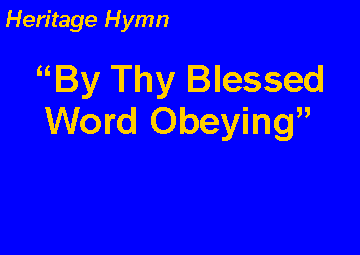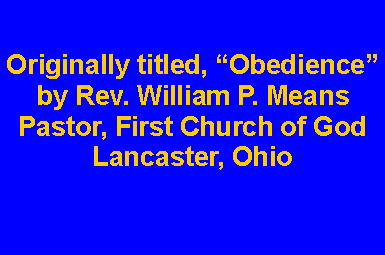

|
To truly understand this hymn we must know about the writer and composer. The words of this hymn were written by D. S. Warner, whom many regard as the “father” of the Church of God Reformation Movement. Inspired by the rediscovering of the great truths of the New Testament, there awakened within him an ability to transcribe these truths into dramatic poetic form. Regarding the theme of this song, Warner had a deep commitment to the “Truth,” God’s Word as seen in this song. Rarely did he write the music to his poems but he depended upon others gifted in musical composition to do so.
One so gifted was Andrew Byers who was born into a musical family. He began trying to compose music after a group of Church of God singers visited the family home in Illinois in April of 1888. He was deeply influenced by Barney Warren, who has been called the chief musician of the Church of God. Byers was also extremely familiar with Warner, being the author of his biography, The Birth of a Reformation.
The late Dr. Dale Oldham wrote, “It was the inspired music which had so much to do with bringing to birth a new spirit of reformation among the people.” “It was inspired music coupled with inspired preaching and witnessing which led people to Christ and guided them into the ways of truth and righteousness.”
All of our pioneers of the Movement were completely committed to the Word of God as they understood it. They believed that if we adhered to its precepts, we would always be led in proper paths by the Holy Spirit. This particular hymn embodies that conviction.
Let us briefly analyze the intention of this great hymn. The first verse asserts if we obey God’s Word it proves our love to Him. James 1:22 admonishes us, “But be doers of the word, and not hearers only” (NKJV), to which we should add the words of Jesus as He taught us in John 14:15, "If you love Me, you will keep My commandments” (NASB). Our primary duty as Christians is to believe and obey the Word of God.
Verse two postulates that there are those who pretend to love God, but that one can observe that they are not true followers of Christ because they “cast aside” God’s commandments. The rest of the verse asserts that “we” (true believers) will abide in God’s truth, not merely making an empty profession of faith. In fact, Jesus declared, “If you keep My commandments, you will abide in My love, just as I have kept My Father's commandments and abide in His love” (John 15: 10 NIV). True believers live out this conviction.
Verse three speaks of the essentiality of God’s Word in our lives. Jesus spoke this same truth when He was being tempted by the devil in the wilderness stating, “It is written, 'Man shall not live by bread alone, but by every word that proceeds from the mouth of God.’” (Matthew 4: 4 NKJV). The last part of this verse warns that strife will come to those who oppose God’s Word. Paul had the same concern, and wrote to his son in the faith, Timothy, about it. In the third chapter of 2 Timothy he speaks about how false teachers will arise in the last days: “And just as Jannes and Jambres opposed Moses, so these men also oppose the truth, men of depraved mind, rejected as regards the faith. But they will not make further progress; for their folly will be obvious to all” (2 Timothy 3: 8-9 NASB). We must constantly be on our guard against people who pervert the Word of God so we avoid this kind of strife in our lives and our witness.
Verse four is an acquiescence of the wisdom of following in the ways of the Lord and it says, if we have God’s love in us, it is a delight to obey the dictates of the Bible. Sadly, there will be many who will say God’s Word contains fables, supposition and superstition. These same liberal theologians believe God’s Word is not inerrant and is merely a guide through life, but, to quote the Apostle Peter, “We must obey God rather than men” (Acts 5: 29 NASB). It would also be a good thing to follow the advice David gave on his deathbed to his son, Solomon, “And keep the charge of the Lord your God, to walk in His ways, to keep His statutes, His commandments, His ordinances, and His testimonies, according to what is written in the law of Moses, that you may succeed in all that you do and wherever you turn” (1 Kings 2: 3 NASB).
The final verse informs us that God’s commandments are a waymark on the road that will lead us to heaven. “Waymark” is an archaic word that means direction sign. That is an apt description of the Word of God for our lives! The Psalmist reminds us, “Thy word is a lamp to my feet, and a light to my path” (Psalm 119: 105 NASB). If we will follow God’s Word daily it will guide us in the proper directions through life and into eternity.
I love the chorus of this insightful hymn which proclaims “Dear Redeemer, we would hallow, All thy word, so firm and true, In thy footsteps meekly follow; Thy commands we love to do.” I hope we all subscribe to this sentiment, for if we hallow the Word of God and follow its precepts we will never go wrong!
That is what Pastors’ Fellowship is all about . . . proclaiming Biblical truth and always providing a venue for our wonderful Church of God doctrines as found in the Bible to be preached and written about. My recommendation is, we need to take this hymn back out of the archives, dust it off and begin to sing it again as we attempt to follow its wise advice of lifting up the Bible as our “rule of faith.”
BIBLIOGRAPHY
The Holy Bible (NKJV & NASB) The Theology behind Church of God Hymns (1998) (compiled by Pastors’ Fellowship) Buehler, Kathleen D., Heavenly Song (Anderson, IN: Warner Press, 1993) Callen, Barry, First Century: A Time to Remember (Anderson, IN: Warner Press, 1979)
|

